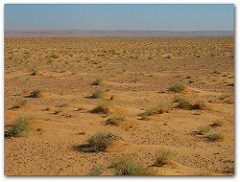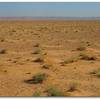clear

source:
Klaus Wagensonner / Flickr
Starting in 2006, Syria suffered its worst drought in 900 years; it ruined farms, forced as many as 1.5 million rural denizens to crowd into cities alongside Iraqi refugees and decimated the country’s livestock. Water became scarce and food expensive. The suffering and social chaos caused by the drought were important drivers of the initial unrest.
Climate scientists have argued that global warming very likely exacerbated the historic drought, thanks to potentially permanent changes to wind and rainfall patterns. Thus, even if negotiators do reach a resolution, the underlying strains in the region may be here to stay. In fact, almost half of the countries most at risk of water shortages in the coming decades are in the Middle East or North Africa.
The sad reality is that supply disruptions are increasingly likely at the same time as the world is facing rising demand for water. The toxic combination of population increases and water-intensive lifestyles, driven by affluence, may lead to devastating price spikes. Expect water wars in the decades ahead.
Sadly the climat change in Syria contributes in making everything ten times worst for everyone there.
clear
 Wafa Benizid
8 years, 3 months ago
Wafa Benizid
8 years, 3 months ago
well, I guess they might fight about territories with scarcity of water.
 2
2
clear
Several studies have pointed to a link between climate change and the civil war in Syria, which started in 2011 and is still ongoing as of 2015. The direct causes of the conflict relate to popular discontent with the government. Yet the mishandling of a major drought in the preceding years likely fed into this discontent, and climate change increased the likelihood for such a drought.
In recent years, there has been an increase in incidences of water-related violence around the world at the subnational level attributable to the role that water plays in development disputes and economic activities. Because conflicts are rarely, if ever, attributable to single causes, conflict analysis and concomitant efforts at reducing the risks of conflict must consider a multitude of complex relationships and contributing factors. This paper assesses the complicated connections between water and conflict in Syria, looks more broadly at future climate-related risks for water systems, and offers some water management strategies for reducing those risks.
 0
0
clear
It's a stress & risk multiplier (lots of reports on this, incl. US army one) ...
 0
0
clear
Drought
 0
0
clear
Climate change itself has the same effect on all nearby regions and cannot be excluded to Syria only. If there is going to be a drough year, it is going to be everywhere in the middle east and therefore there is no direct or specific climate change effect on Syria alone. Concerning the war in Syria, climate change will harden the living conditions, by making resources more scarce to obtain.
 0
0
clear
 Ignas Mikalauskas
7 years ago
Ignas Mikalauskas
7 years ago
Starting in 2006, Syria suffered its worst drought in 900 years; it ruined farms, forced as many as 1.5 million rural denizens to crowd into cities alongside Iraqi refugees and decimated the country’s livestock. Water became scarce and food expensive. The suffering and social chaos caused by the drought were important drivers of the initial unrest. Climate scientists have argued that global warming very likely exacerbated the historic drought, thanks to potentially permanent changes to wind and rainfall patterns. Thus, even if negotiators do reach a resolution, the underlying strains in the region may be here to stay. In fact, almost half of the countries most at risk of water shortages in the coming decades are in the Middle East or North Africa. The sad reality is that supply disruptions are increasingly likely at the same time as the world is facing rising demand for water. The toxic combination of population increases and water-intensive lifestyles, driven by affluence, may lead to devastating price spikes. Expect water wars in the decades ahead.
 0
0
clear
 SHAHABUDDIN AMIN
6 years, 2 months ago
SHAHABUDDIN AMIN
6 years, 2 months ago
test
 0
0
clear
 Tomáš Zukal
4 years, 9 months ago
Tomáš Zukal
4 years, 9 months ago
hey
 0
0
clear
 gates watkins
4 years, 4 months ago
gates watkins
4 years, 4 months ago
Climate change can make people hot and irratable more so then they would have been. Also if the tempreture is very hot camels won't be able to travel as many miles and this could affect how many bullets and rockets the fighters are able to transport with them.
 0
0
clear
idk
 0
0
clear
 JONATHAN HARRISON JR
5 years ago
JONATHAN HARRISON JR
5 years ago

Sign up to post or vote on answers.
Improveo will help systemize your knowledge.
